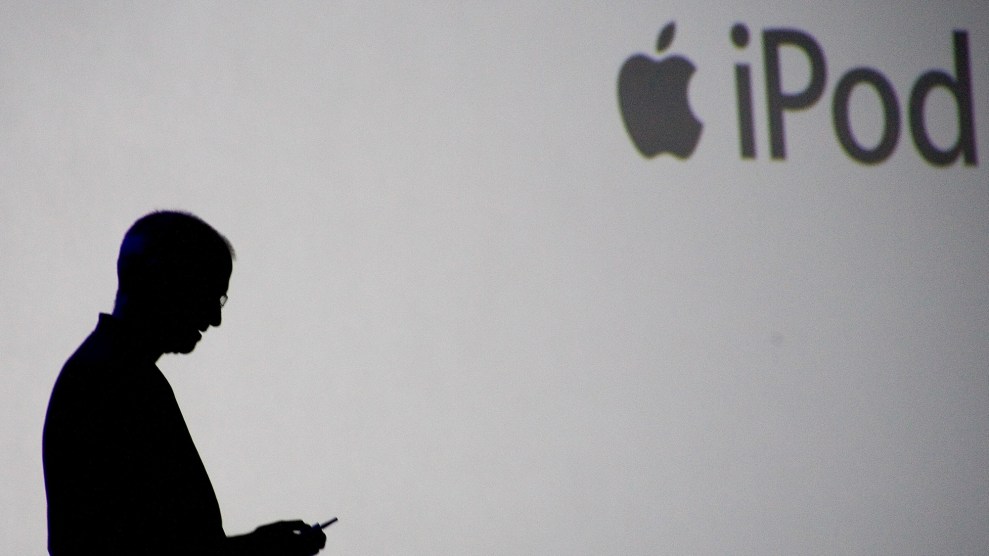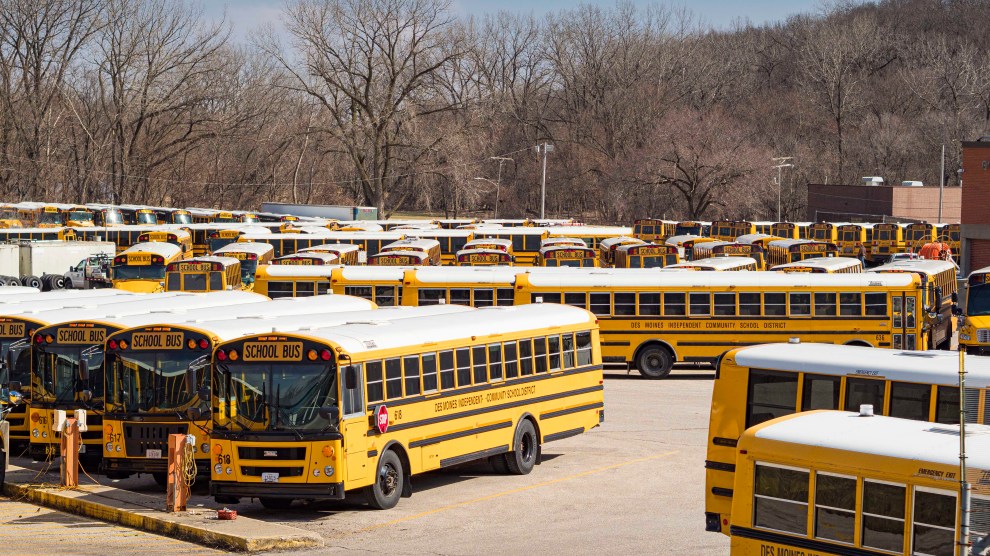
Tim Wagner/ZUMA
It’s hard to get through a day without hearing the word “pod.” We have work pods. Friend pods. School pods. Storage pods. Tripods. Espresso pods. Ear pods. Air pods. Podcasts.
“Pod” is the word of the moment. It’s short, snappy, and packs a lot of meaning in a few letters: from the organic, adorable image of two peas in a pod to a frisky pod of dolphins. It also flicks at the space-age futurism of the pods in 2001: A Space Odyssey and Star Trek. “Podding” is the name of the game during the pandemic. We want to cluster and contain. Stay separate, but be together. Resist infection, but transcend inconveniences.
But the “pod” phenomenon predates COVID-19. In many ways, pod is the defining word of the millennial era and the millennials who came of age during it. The iPod came out in 2000, disaggregating songs from their albums. In 2004, podcasts quickly followed suit, breaking down the publishing barriers of the radio spectrum. The detergent industry embraced all sorts of pods with Procter & Gamble introducing the Tide pod in 2012. Elon Musk is supposedly designing pods that will liberate people from airplane cabins, shooting us around the world at lightning speed. The word “pod” signals progress, innovation, choice…and the atomization of everything.
Star Trek-style pod gliding at 700 miles/hr? count me in @elonmusk – https://t.co/DyKEvKjB44 via @business @danahull pic.twitter.com/eLvwzYEbQD
— Marie Mawad (@Marie_a_Paris) January 29, 2016
At the risk of sounding like a “Houllebecquian” critic of modernity, I can’t help but wonder if in the quest for ever more individualized options, we aren’t calculating the human cost. As Douglas Rushkoff explained in an article earlier this week, pods offer those with economic means a cocooned insularity. In today’s virus-riddled world, pods equal freedom, choice, and mobility. A pod is an escape hatch from society. But what if in a rush to avoid one kind of disaster, those who are podding off are courting a different kind of dystopian future—one that looks less like Pandemic and more like The Machine Stops. Don’t we really lose something when we don’t listen to a song in the context of its album?
Life in 2020 is beginning to resemble one big choose-your-own-adventure game. The very millennial fast-casual restaurant where you can “build-your-own-bowl,” à la Chipotle or Sweetgreen, is extending into all aspects of our strange new existence. There’s a line of ingredients in front of us that can be combined in endless permutations and combinations—PPE, face masks, face shields, COVID tests, contact-tracing, social distancing, virtual learning, microschools, Zoom happy hours, Hinge dates in the park. The parameters are stark and the stakes are high. With the lack of coherent guidance and surrounded by failing systems, we’re splintering off to make our own pods of clarity. Schools are remote? Fine, we’ll pod up and make our own. Offices are closed? Fine, we’ll set up our own work-from-home spaces and carry on. Friends are potential disease vectors? Fine, we’ll elbow bump and dine in clusters with our closest ones, six feet apart from those other breathing petri dishes.
The allure of self-contained, autonomous clusters—a.k.a. “pods”—is powerful. They mirror the promise of decentralized techno-solutionism that many a Silicon Valley type has tried to foist upon us at every possible turn. Their COVID-era education efforts are no exception. Spearheaded initially by Silicon Valley investors and entrepreneurs, the “microschool” train took off with seed funding, parent-teacher matchmaking startups, and cringe-worthy ads for private nannies and tutors that have gone viral.
Top Silicon Valley investor Jason Calacanis epitomized this idea of the pod parent when he sent a tweet in early August saying that he was “looking for the best 4-6th grade teacher in the Bay Area, “to teach “2-7 students in my back yard,” offering to pay that teacher more than their current salary, sweetening the deal with a $2,000 Uber Eats gift card referral fee. His tweet made news because it seemed to embody the caricature of a pod parent: the entitlement that his kids shouldn’t have to suffer through virtual school along with the plebs, the fact that he had the means to pay a teacher more than a school would, and the audacity to poach a great teacher from a school system where they would likely be changing more lives than those of the 2 to 7 students who could fit in Calacanis’ backyard “microschool.”
Looking for the best 4-6th grade teacher in Bay Area who wants a 1-year contract, that will beat whatever they are getting paid, to teach 2-7 students in my back yard#microschool
If you know this teacher, refer them & we hire them, I will give you a $2k UberEats gift card
— jason@calacanis.com (@Jason) August 2, 2020
Well, I have news for you. There is a name for these school “pods.” It’s called homeschooling. I grew up with three siblings who were homeschooled and parents who were judged as being backward weirdos for making that decision: the language here matters. I can understand why certain parents might prefer to use the word “pod.” It doesn’t carry the same stigma of overprotective, anti-social, anti-science, religious zealots that I suspect one or two eager new pod parents might have projected onto homeschoolers in the past.
But from what I’ve read about pods, they operate almost exactly the same way that homeschooling has for a long time. “Pod” parents can make up their own curriculum. They can team up with other parents to participate in activities and classes together. They can hire private educators and tutors for certain specialized subjects. They can preserve the in-person, physical, experiential side of education that students are losing in virtual school. They can personalize school to the interests and learning styles of their children. This is homeschooling. Past studies have shown that homeschooling cuts across socio-economic divides. It remains to be seen whether school pods will do the same.
Based on the exploding interest in homeschooling in recent weeks, the Executive Director of the National Home School Association, J. Allen Weston, estimates that the four million homeschooled K-12 students will increase to 10 million by the end of the 2020-2021 school year. Facebook groups for parents interested in podding up and homeschooling together have expanded rapidly. Alternative schools, like private schools with a focus on outdoor education, have also been seeing record enrollment numbers.
Search interest in Homeschooling is surging this summer in the US. #homeschooling https://t.co/HpW2e7JfCF pic.twitter.com/zyGKmfB5PW
— GoogleTrends (@GoogleTrends) July 23, 2020
The social dynamics in these somewhat anarchic pods are bound to get interesting. In the age of the coronavirus, asking someone to “join your pod,” be they friends, lovers, family, or neighbors, feels like a vulnerable and intimate question. It connotes that you value their friendship enough to risk disease, and trust them enough not to be promiscuous in their podventures. Extending that trust to fellow parents and running a school together? Should be next-level. Or perhaps it’s where it all begins. Meanwhile, I have single friends who are furiously trying to date (safely) and find a special someone to pod up with before the winter weather descends and we’re all stuck indoors with no more dining al fresco.
I was listening to a podcast the other day (I know). It was an interview with a woman who seemed to embody the entire paradox for me. She was in her mid-30s. She spent most of the podcast talking about her career trajectory, which involved jumping from job to job. She was pursuing her career dreams. The way she told the story, her agility and willingness to take risks led directly to the success and career fulfillment that she has achieved. But then, in the very same conversation, she talked about loneliness. How she feels lonely, how other people feel lonely, about how she’s setting up discussion groups to combat loneliness, and doing research into the severe mental health impacts of loneliness.
The inherent contradiction slapped me across the earpods. The very mobility that made it possible for this woman to jump between careers is probably the same thing that’s making her feel lonely. It seemed so obvious to me because I can relate. I too have jumped around. In the ten years since graduating college, I’ve lived in eight cities across four countries, held at least eleven different jobs, and generally indulged my desire to forge my own path. At almost every juncture in my life, I’ve chosen change over stability. I’m not saying that this woman’s tradeoff wasn’t worth it—merely that the tradeoff exists. Mobility and rootedness sit at opposite sides of the spectrum. Like a see-saw, when one side goes up, the other must come down.
But anyway, this isn’t about my existential crises, though they are many and occasionally entertaining. We can add “pod” to the growing list of words that mean something a little different today than they did six months ago. And even with all the ways the word has become so ubiquitous as to lose some of its meaning, as an avowed podcast fanatic and the associate producer on the Mother Jones Podcast, I can attest that the age of the pod isn’t all bad. I will hop on a Zoom call with my edit pod on Thursday. I’ll keep calling our podcast team the “pod squad.” I even invited another friend to join my social pod this week (she said yes!). The word “pods” still has utility, even though, at this point, it seems as if it can be applied to absolutely anything.

















